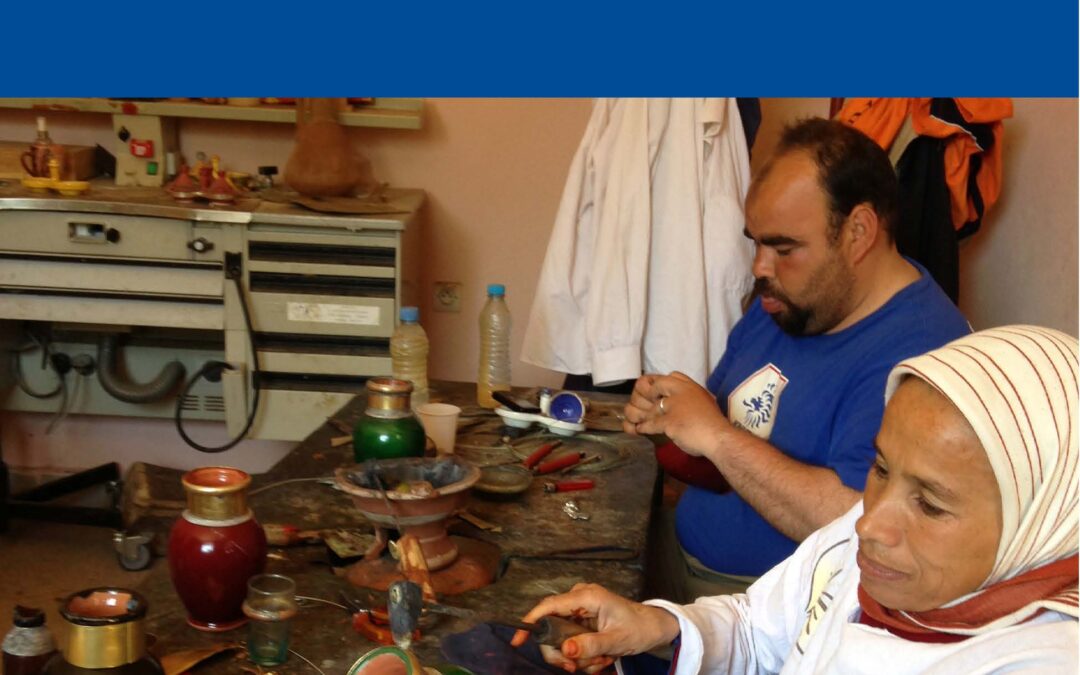
Jan 31, 2014 | Plaidoyer
Dans une prise de position publiée aujourd’hui, la CIJ évalue la conformité des principales dispositions de la nouvelle constitution avec le droit et les normes internationales.
Le 26 janvier 2014, trois ans après l’éviction du président Ben Ali, l’Assemblée nationale constituante tunisienne a voté pour sa nouvelle constitution.
La CIJ estime que la constitution adoptée est le produit d’un processus représentatif et inclusif.
Néanmoins, à certains égards, la constitution est en deçà du droit international et des normes internationales.
A ce titre, la CIJ recommande aux autorités tunisiennes de prendre en compte les déficiences de la constitution mise en évidence dans ce document.
Tunisia-Evalusation Nouvelle Constitution-Advocacy-Position Paper 2014-Fr (Texte complet en PDF)

Nov 21, 2013 | Communiqués de presse, Nouvelles, Publications, Rapports
La CIJ a appelé aujourd’hui les autorités marocaines à assurer une réforme globale et significative du pouvoir judiciaire.
Cette déclaration intervient alors que la CIJ vient de conclure une mission de haut niveau au Maroc et de lancer son rapport «Réformer le système judiciaire au Maroc », le 21 Novembre 2013.
La CIJ a déclaré que les réformes devraient viser à mettre fin à toute forme d’influence ou de contrôle abusif du pouvoir exécutif sur les affaires judiciaires.
Elle a appelé au renforcement de l’autorité du Conseil Supérieur du Pouvoir Judiciaire (CSPJ) nouvellement créé, sur tous les aspects relatifs à la carrière des juges et des procureurs.
La CIJ a souligné que le Ministère Public devrait être séparé du pouvoir judicaire et qu’il devrait conduire ses activités de manière objective et impartiale, et en défense des droits de l’homme.
L’organisation a également demandé à ce que la compétence des tribunaux militaires soit limitée au personnel militaire pour manquement à la discipline militaire, et qu’en aucun cas ces tribunaux ne devraient être utilisés pour juger des crimes constituant des violations des droits de l’homme.
Morocco – Réforme judiciaire – News-press release-2013-Fr (Texte complet en PDF)
Maroc – Réformer le système judiciaire-publications-rapport RESUME-2013-fr (Résumé du rapport en PDF)

Nov 21, 2013 | Articles, Nouvelles, Publications
Ce nouveau rapport de la CIJ sur accès à la justice pour les droits économiques, sociaux et culturels au Maroc a été présenté à l’issue d’une mission de quatre jours dans le pays. Il a largement bénéficié des informations et discussions collectées et menées au cours d’un processus entamé en 2012.
Le rapport souligne que les provisions de la Constitution de 2011 devraient contribuer à garantir les droits économiques, sociaux et culturels.
Mais il identifie aussi un certain nombre de lacunes qui privent de nombreux(ses) Marocain(e)s d’accès à la justice en cas de violation de ces droits.
Un atelier organisé en collaboration avec l’Organisation marocaine des droits humains en septembre 2012 et une mission de recherche organisée conjointement par les programmes DESC et MENA de la CIJ en avril 2013 ont été l’occasion de consulter des acteurs pertinents, qu’ils soient utilisateurs ou au service de la justice.
Morocco-Access to Justice ESCR-publications-report-2013-Fr (full text in French, pdf)

Nov 7, 2013 | News
FIDH, ILGA-Europe, ICJ, AIRE-Centre and HLHR welcome this important decision. The organizations had submitted written comments about the case to the Court in June 2011.
In a judgment in the joint cases of Vallianatos and Mylonas v. Greece and C.S. and others v. Greece delivered today, the Grand Chamber of the European Court of Human Rights ruled that Greece had violated the European Convention on Human Rights by excluding same-sex couples from a “civil union”, restricted in Greece to heterosexual couples.
“All Member States of the Council of Europe must condemn any form of discrimination against homosexuals. Homosexual couples, as heterosexual couples, involved in a stable relationship, should benefit from a legal recognition”, said Karim Lahidji, FIDH President. He added: “Twenty-two of the Member States of the Council of Europe have created a legal form of recognition for same-sex couples. Greece must change its law to comply with the European Convention on Human Rights”.
Evelyne Paradis, Executive Director of ILGA-Europe, said: “The European Court of Human Rights reaffirmed already established principle that sexual orientation discrimination is in breach of the European Convention. Now the Court took yet another step to say that if a country provides legal recognition to unmarried heterosexual couples in a form of civil unions, same-sex couples also must be able to benefit from such legal recognition. European consensus on the legal recognition of same-sex partnership is constantly growing and we welcome the fact the Court is taking it into account and reflect in its jurisprudence.”
Livio Zilli, Senior Legal Adviser at the International Commission of Jurists, said: “The Court reiterated that the Convention was a living instrument to be interpreted in the present-day conditions and that the state was obliged under the Convention to take account of societal developments, as well as the fact that there is no single way or choice when it came to people’s exercise and enjoyment of their right to family or private life.”
In its decision, the Court ruled that Greece had failed to provide a convincing justification for excluding same-sex couples.
The Government’s argument, according to which the law’s main purpose was to protect children of unmarried parents, did not constitute a valid reason, because the law’s real objective was the legal recognition of a new form of family life.
Therefore, exclusion of same-sex couples breaches the Convention.
In November 2008, Greece adopted a law creating the “civil unions”, an alternative to marriage.
However, the first article restricts such unions to “two physical individuals of different sex who have reached the age of majority”. An animated debate relating to the inclusion of same-sex couples took place before the adoption of this law.
During the debate before the Hellenic Parliament, the Minister of Justice at the time, declared: “We mustn’t include same sex couples. We are indeed convinced that the needs and demands of the Hellenic society do not cross this line; as a legislator, the political party in power is accountable to the Greek people; we have our own beliefs and negotiations are over; I believe it is the way to go”.
In their written comments, FIDH, ILGA-Europe, ICJ and AIRE-Centre recalled that the European Court has repeatedly condemned direct discrimination based on sexual orientation as a violation of protected rights.
The Court’s case-law reiterates that when it comes to a difference in treatment based on sex or sexual orientation, the principle of proportionality does not merely require that the measure chosen is in principle suited for realising the aim sought.
It must also be shown that the discriminatory treatment is necessary in order to achieve that aim, otherwise the measure will be in violation of the Convention. Creating a “civil union” only for unmarried different-sex couples amounts to direct discrimination and therefore violates the Convention.
Today’s decision follows recent jurisprudence of the Court against discrimination of same-sex couples. On February 2013, in the X. and others v. Austria case, the European Court condemned Austria for banning a homosexual person to adopt the biological child of his/her partner. It decided that the ban of unmarried same-sex couples, which are in the same situation than unmarried different-sex couples, was not justified and violated article 14 of the Convention in conjunction with article 8.
Contact:
Livio Zilli, Senior Legal Adviser, ICJ, e-mail: livio.zilli(a)icj.org
Additional information:
- Judgement of the European Court of Human Rights in the case of Vallianatos and Mylonas v. Greece and C.S. and others v. Greece
- According to the Rainbow Europe’s Index (May 2013), Greece came 25th among 49 European countries in terms of laws and policies affecting the human rights of LGBTI people.
Greece-Vallianatos_CEDH-news-press release-2013-FR (full French text in pdf)

May 3, 2013 | Articles, Nouvelles, Plaidoyer
Aujourd’hui, la CIJ a adressé une lettre au ministre tunisien de l’intérieur et au ministre de la justice pour leur demander de prendre des mesures immédiates afin d’assurer la sécurité et l’intégrité physique du juge Kalthoum Kennou.
Le juge Kalthoum Kennou est un juge tunisien à la Cour de cassation, présidente de l’association tunisienne des magistrats et commissaire de la CIJ.
Cet appel intervient alors que le juge Kennou a reçu une lettre contenant de graves menaces de mort, exigeant son retrait de la magistrature.
Le juge Kennou est active dans la mise en place d’un pouvoir judiciaire indépendant ainsi que pour la protection des droits de l’Homme.
La CIJ condamne fermement ces menaces et tous les actes d’intimidation contre le système judiciaire et les défenseurs des droits de l’Homme en Tunisie.
La CIJ appelle également les autorités tunisiennes à ouvrir les enquêtes nécessaires pour trouver, poursuivre et punir les individus derrière ces menaces brutales.
Tunisia-Lettre Kalthoum Kennou – MoI-advocacy-2013 (Lettre complète en pdf)









